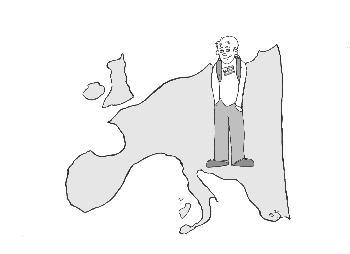
News
When Professors Speak Out, Some Students Stay Quiet. Can Harvard Keep Everyone Talking?

News
Allston Residents, Elected Officials Ask for More Benefits from Harvard’s 10-Year Plan

News
Nobel Laureate Claudia Goldin Warns of Federal Data Misuse at IOP Forum

News
Woman Rescued from Freezing Charles River, Transported to Hospital with Serious Injuries

News
Harvard Researchers Develop New Technology to Map Neural Connections
An American in Europe

OXFORD, England—“Excuse me, I’m sorry to bother you, but are you an American?” a young woman right behind me in line asked in a McDonald’s here in Oxford a few months ago, detecting my unmistakable American accent as I was ordering a large French fries. “Because I’m really so sorry about what happened on Sept. 11,” she continued, “and I want you to know that all of us here in Britain were absolutely horrified.”
This unexpected comment, of course, seemed a little odd—although I certainly did appreciate those kind words from a person whom I never before had met. But the supportive tone of that young woman has proven very typical of so many Brits and other Europeans whom I’ve encountered this past year.
And that supportive tone here in Europe has done so much to sustain me through a troubled time. When I left the U.S. to study at Oxford just over a year ago, I was freshly traumatized by the national ordeal we all had endured just a couple of weeks before. Leaving friends and family to travel far from home is always tough, but that trip was all the tougher when I knew that my loved ones were living under the cloud of fear and confusion that the terrorists had imposed on us.
So I know from my personal experiences here how the overwhelming majority of Europeans feel great sympathy and affection for America. That’s why I’ve been so disappointed to read the columns and articles of some hardline commentators back home, who haphazardly hurl epithets—“anti-American,” “appeasers,” “dictator coddlers” and so forth—at Europeans. Describing the people who rushed to our side after Sept. 11 this way is wrong, and that sort of rhetoric flies in the face of Europeans’ genuine sympathy.
But the depth of the European-American bond is not limited to that sympathy alone. The great powers of Europe—Britain, France, and Germany—are among the most tolerant and democratic nations on earth, and terrorism appalls them as much as it appalls us. These common values have always underpinned the bond between us.
Any differences of opinion between Americans and Europeans on Iraq, civil liberties or the role of the U.N. stem from different approaches to international politics, not from different values. They are mere squabbles among people committed to promoting democracy, pluralism, and good governance. And once we all recognize and respect that shared commitment, we’ll be able to tackle the war on terrorism—and all the democratization challenges embedded in that struggle—all the more forcefully.
Let’s not forget what European-American cooperation has accomplished since World War II. Together, Europeans and Americans have faced down Communism when the Soviets were threatening to “bury” us; we dismantled the racist apartheid regime in South Africa and turned that country into a model of democracy; we’ve moved the Balkans out of its long nightmare of ethnic cleansing and unremitting violence to a new dawn of peaceful coexistence and prosperity; now we’re working together to build an accountable government in Afghanistan that will reintegrate the Afghan people back into the world community. The list of our common accomplishments is fantastic.
And so when unilateralist commentators back home like William Safire and Charles Krauthammer demean the European-American relationship, they jeopardize those shared accomplishments and the promise of many more—like winning the war on terrorism. In that way, their uncompromising words actually imperil our security by undermining the key global alliances that will protect America from more terrorism.
So here in England, as I continue each day to turn on my computer to read American newspapers on the web, I hope that this misguided invective starts to disappear. Those nasty columns do nothing to reinforce our security. And they’re insulting to all those Europeans who share our values and want to work with us to fight the terrorists who killed so many Americans last year. Next time my American accent encourages another sympathetic comment from a Brit in the Oxford McDonald’s, I want to be able to tell her that all Americans value our trans-Atlantic partnership just as much as she does.
Jason H. Wasfy is a Marshall Scholar and graduate student in politics at Oxford. He will begin at Harvard Medical School in the fall of 2003.
Want to keep up with breaking news? Subscribe to our email newsletter.
